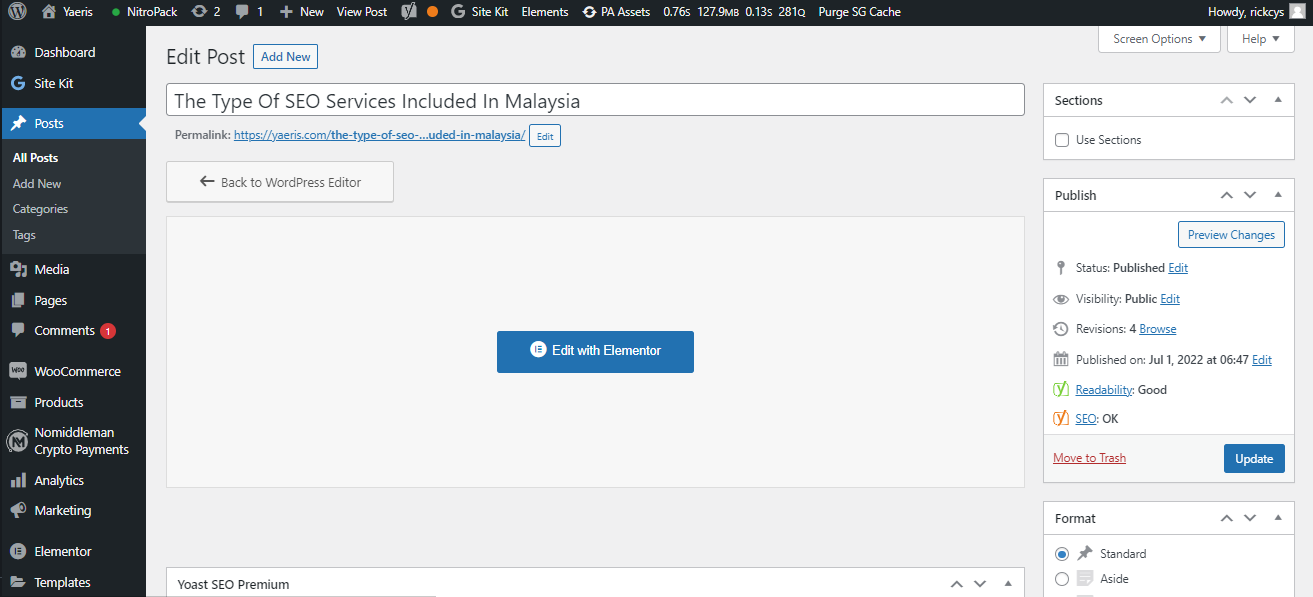Table of Contents
9 Simple Steps To Perform SEO On Your Website
The inner workings of popular search engines like Google, Bing, and others are important to grasp the concept of search engine optimization (SEO). Exactly how do they rank in the search engine results page? Inconceivably, there are a plethora of websites dedicated to the same subject matter.
If nothing more is known, a search engine like Google will include a link to a webpage in its index. Think of it as a digital version of the yellow phone book.
The information on your website is crawled and indexed by search engine bots once it has been created so that it appears in related search results. These days, search engine bots can grasp your website’s context (text, structure, and non-text content) and use that knowledge to determine relevance and authority when indexing your pages.
In this case, search engine optimization (SEO) comes into play. The goal of SEO is to raise your website’s position in search engine results. It’s all about making websites more relevant to search engines so that they can rank them correctly.
What are the benefits of SEO?
SEO has already been discussed in detail in the preceding section. Think about your own search patterns to have a better grasp of this.
Let’s imagine you’re looking for information on a specific topic, such as “the greatest email marketing tools,” and you type that into Google. You can either write ‘tools for email marketing or something similar in the search bar. You get a list of results right away.
Which link will you choose?
What about the second and third pages of results? No, and if so, not very often.
The importance of SEO may be shown in this example. Search engine optimization (SEO) improves your website’s overall search ranking.
To improve the number of visitors to your website, you want to be on the first page (or at least within the first few entries) of the search results returned by your target audience.
Make use of relevant keywords all-around your website
There are a variety of relevant keywords on each page or blog article. ‘SEO for Beginners’ is the keyword for this post. It’s likely that’s what you were searching for when you saw this page!
The best place for your chosen keywords is in the:
- Title of the post

- The URL

- In the post’s first and final paragraphs.
- In the text organically throughout the post
- The tags of images used

Place links to previously published content on your site.
Make a link to the post you’re working on right now if it’s linked to one you’ve already written. Your posts and pages on your website should be linked to one another. For the reader, this will assist them discover more content on your site, as well as help search engines index and categorize your pages.
Create high material. There is no keyword stuffing
There’s no escaping the fact that you need to provide content that’s engaging to your audience. Don’t forget to include all of the relevant details in your essay. An important part of your job is to give your audience a broad overview of the topic at hand while also addressing their unique concerns.
More words may not always imply higher quality, but they can indicate that the issue has been well explored. There is a correlation between word count and ranking, as well as between content depth and ranking.
Aside from addressing your topic thoroughly, writing in a clear, beautiful, and conversational style does wonders. Don’t stuff your keywords all over your post in the hopes of getting a high keyword density. Attempting to game the system by stuffing as many keywords as possible everywhere will not succeed, and many people will be penalized for it.
Search engines are extremely clever and can detect term stuffing.
Remember to include a digital app
Because more and more people are using their smartphones and other devices to access the internet, it is imperative that your website be optimized for mobile devices. Your bounce rate will soar since no one wants to spend time on a site that isn’t mobile-friendly. Incorrect formatting can result in a broken button or the need to scroll to the side of the page in order to see the complete page.
A pleasant user experience encourages visitors to stay and explore your website, indicating that your page is relevant for the keyword you selected. Indeed, mobile formatting is so significant that Google has indicated that it would soon begin mobile-first indexing of web pages.
Refresh your sites and content

You should do an SEO audit on a regular basis to keep your material up to date. Especially since information and trends change so quickly, and you don’t want to be punished in search rankings for having outdated information.
Examine older pages and sites, evaluating the content and ensuring that everything is properly optimized. If your material no longer serves a function and is not properly optimized, it will most likely harm your ranking.
Image optimization
Images are quite significant in terms of readability. They aid in visualizing your content and making it more understandable to readers. However, they are also vital for SEO because they allow your website to be indexed. An image cannot be crawled; however, the image ALT-text, or image description, can be crawled and indexed.
ALT-Text allows Google to find images with the keywords you select.

Have you ever paid attention to the images that display at the top of your search results? They are also an excellent approach to direct visitors to your website and, as a result, suggest that your website and photographs are related to the search topic. Image compression is also a significant consideration. Using the right image size and style can have a major impact on your website’s SEO. So be certain that your photographs are properly optimized. You can simply accomplish this by employing image compression software.
Page Speed

Your website’s page speed is critical for ranking, and Google has been using it as a ranking factor since 2018. People spend seconds on your site before deciding whether to explore it further or leave.
An outstanding user experience is provided by a website that loads rapidly. If your page takes too long to load, the lack of time consumers is ready to wait now will have major effects, resulting in a greater bounce rate. Although bounce rate is not a ranking factor in and of itself, it is closely related to page speed.
SEO for technical purposes
We discussed developing a strong website structure, which is already a component of technical SEO.
However, technical SEO extends beyond permalinks and keyword selection. It is all about making your website responsive. This is an extremely sophisticated and technical issue that goes above and beyond what an SEO for beginners guide would cover. Nonetheless, it’s worth mentioning it here.
Work with a technical SEO specialist as well as your team to determine the best website structure and design for your target demographic.
Capitalize on existing traffic
As a small businessman, you don’t want visitors to peruse your site and then depart. As a result, you want to leave a lasting impression and inspire your customers to come back.
Understanding the user experience is essential if you want to learn how to increase the number of people who convert on your website. Get a handle on how visitors use your site, including whether they scroll down the page and how often they click on your calls to action (CTAs).
In the future, whenever someone joins your email list, you can send them offers, rewards, and more. Additionally, you can urge your audience members to follow you on social media, browse your product pages, and peruse your blog content.
Because more of your organic traffic will convert, you’ll see an increase in your conversion rate. You know exactly what your customers want and how to provide it to them in a way that makes them want to buy from you.
Conclusion
If you know the basics, you’ll have a head start in the SEO game.
The first step is to gather as much information as you can and perform a comprehensive study. Make sure your material is better than your competitors’, but don’t forget to target your audience. If you do not want to perform SEO yourself, you can always outsource it to a digital agency such as Yaeris.
